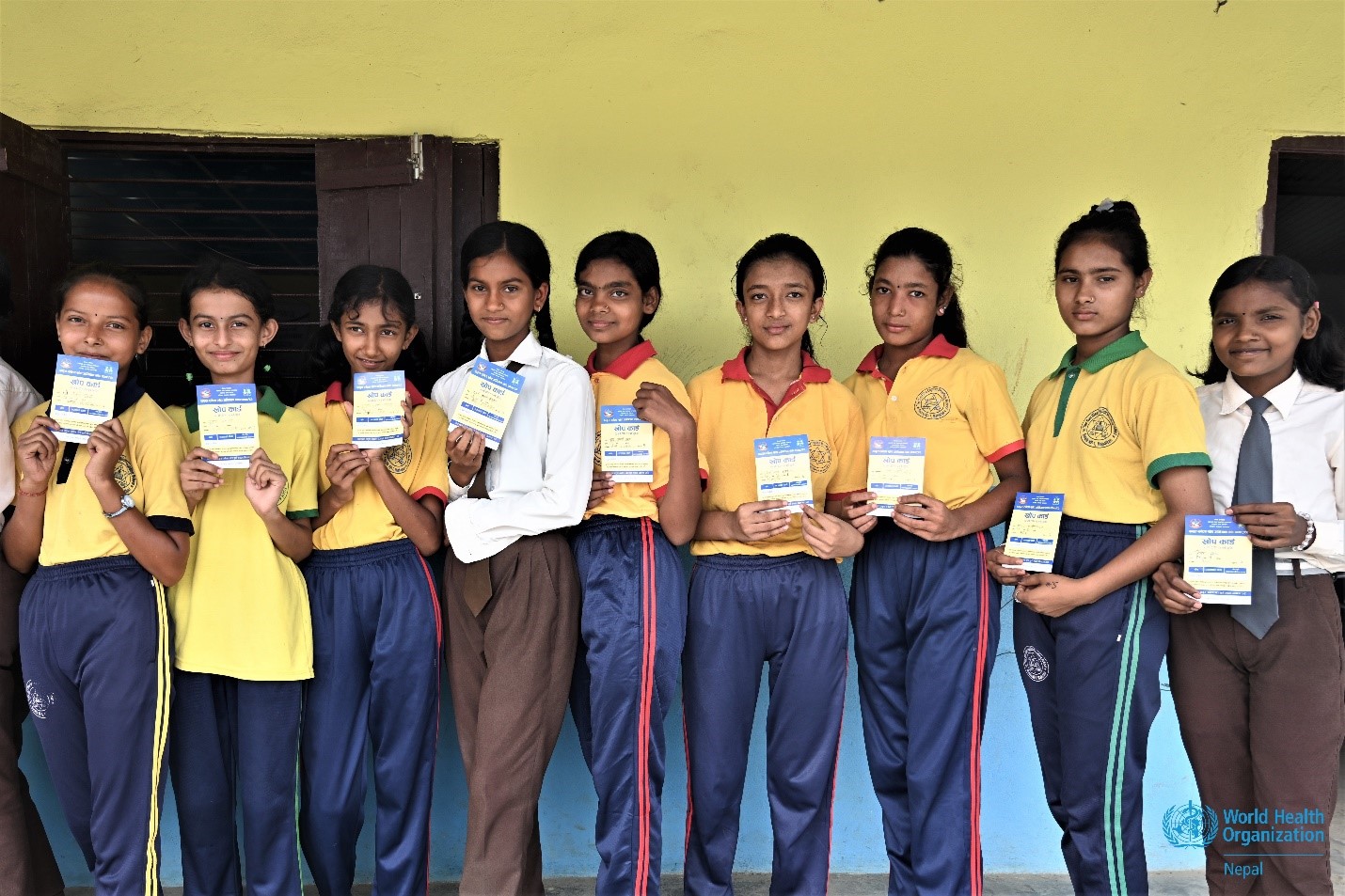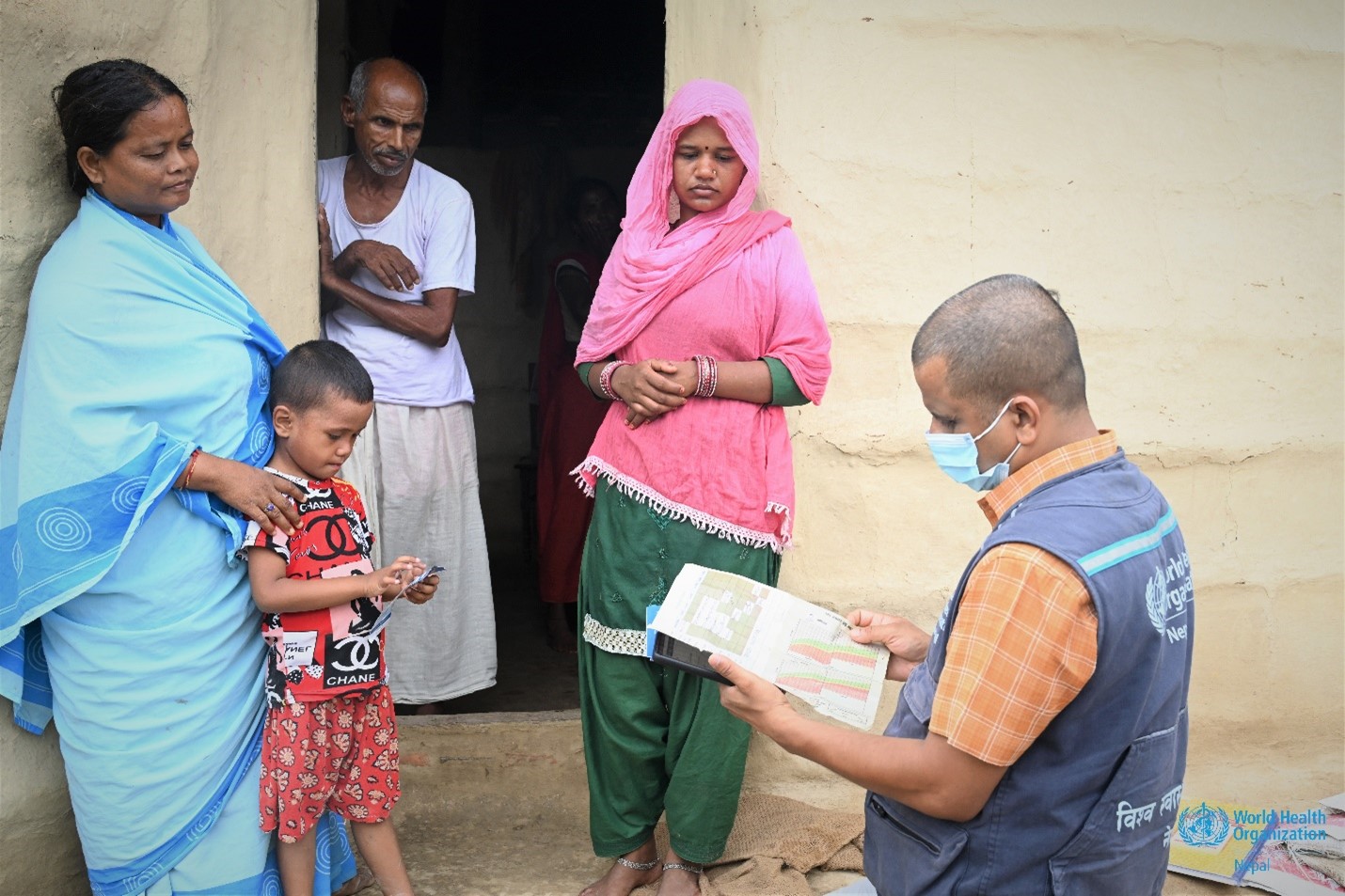More than 1.5 million children under 15 years have been vaccinated with one dose of the measles-rubella (MR) vaccine as part of an outbreak response immunization campaign being held in nine high-risk districts that reported measles outbreak earlier this year.
The campaign, led by the Family Welfare Division (FWD), Department of Health Services (DoHS), with support from the World Health Organization (WHO), UNICEF, and other partners, ran from June to July in Surkhet, Bardiya, Kailali, Kanchanpur, Bajura, and Dang in western Nepal, and Mahottari in eastern Nepal. Morang and Sunsari districts of Koshi Province will be conducting the campaign in August 2023. A similar campaign was conducted in Nepalgunj sub-metropolitan city, Banke district, in January, following the confirmation of an outbreak there.

A group of students wait in line to get vaccinated against Measles-Rubella during the Outbreak Response Immunization campaign in Mahottari district of Madhesh Province. Photo credit: WHO Nepal
While measles is endemic in Nepal and is reported every year, the magnitude and extent of this year’s outbreak are unusually high compared to the previous years. Between January to July, a total of 862 confirmed measles cases has been reported from 37 out of the country’s 77 districts.
“The surge in measles cases in different parts of the country indicates immunity gaps in the population. To address this and to prevent further spread of the outbreak, it was crucial to conduct an ORI campaign targeting 6 months to under 15 years children in all measles outbreak-affected districts,” said Dr Abhiyan Gautam, Chief of Child Health and Immunization Services Section at the FWD, DoHS.
As elsewhere, the pandemic-related disruptions had caused setbacks in Nepal’s immunization program. According to the National Demographic Health Survey 2022, the number of zero-dose children has increased from 1% in 2016 to 4% in 2021. Only 82% of children have received both doses of the MMR vaccine.
“While the overall childhood immunization coverage in Nepal has reached closer to the pre-pandemic coverage, recent data shows that there are still thousands of children who have not received a single dose of life-saving vaccine. To ensure all children everywhere are protected against measles and other vaccine-preventable diseases, there must be continued intensified efforts to get the routine immunization program back on track. WHO will continue to support the Nepal government in its efforts to expand immunization coverage and ultimately eliminate measles-rubella,” said Dr Rajesh Sambhajirao Pandav, WHO Representative to Nepal.

A young student is vaccinated against measles-rubella at one of the session sites in Bardibas Municipality of Mahottari district, Madhesh Province. Photo credit: WHO Nepal
In 2019, Nepal along with other Member States of the WHO South-East Asia Region, committed to eliminate measles-rubella by 2023 by implementing the Strategic plan for measles and rubella elimination in WHO South-East Region:2020-2024. To achieve elimination, Nepal must ensure over 95% vaccination coverage of both MR1 and MR2 doses at all levels of the country.
Member States first adopted the regional goal to eliminate the disease during the sixty-sixth meeting of the Regional Committee for Southeast Asia in 2013. The strategy provides direction and framework for member states to:
- Achieve and maintain high population immunity with at least 95% vaccination coverage with two doses of measles and rubella-containing vaccines in each district of each country,
- Develop and sustain a sensitive and timely case-based surveillance system for measles and rubella,
- Develop and maintain a proficient measles and rubella laboratory network,
- Ensure adequate outbreak preparedness and respond rapidly to measles and rubella outbreaks,
- Strengthen support and linkages to achieve the above strategic objectives.
Following the impact of the pandemic on the national immunization program and services, Nepal has now revised its target to achieve elimination by 2026 and has prepared the National Measles Rubella Elimination Roadmap.
Aligned with the plan, the country is now prioritizing the acceleration and expansion of routine and outbreak response immunization sessions to achieve high vaccination coverage, focusing on building and sustaining effective surveillance systems and response capacities.

A WHO Surveillance Medical Officer visits a household in Gaushala municipality of Mahottari district, Madhesh Province, to verify the immunization status of children living there. Photo credit: WHO Nepal
As a longstanding partner in Nepal’s routine immunization program, WHO has been providing technical support to accelerate efforts to implement the national strategies on measles-rubella and expand the accessibility of quality vaccines for every eligible individual and improve the case-based surveillance system. WHO is mainly supporting to review and revise immunization strategies, identify gaps, prepare micro-planning, strengthen monitoring and reporting mechanism, and capacity building of health facilities and healthcare workers.
